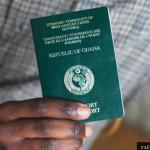For the 2025 Academy Awards, nine incredible films from various African countries are competing for the Best International Feature Film award. This year's entries come from Nigeria, Cameroon, Egypt, Morocco, Senegal, South Africa, Tunisia, Algeria, and Kenya, showcasing a wonderful mix of cultures and stories.
The 97th Academy Awards, set for March 2, 2025, at the Dolby Theatre in Los Angeles, will showcase an impressive lineup of African films competing for the Best International Feature Film category. This year, nine African countries have submitted entries, reflecting the continent's rich cinematic diversity and storytelling prowess.
The submissions for the 2025 Oscars include:
Nigeria: "Mai Martaba" directed by Prince Daniel Aboki
Set in the fictional Jallaba kingdom, "Mai Martaba" is an epic tale exploring themes of power, succession, and tradition. The story revolves around a succession struggle after King Sanaya breaches an agreement to pass the crown to Magajin Gari, instead naming his daughter, Princess Sangaya, as heir. The film features political intrigue, alliances with bandit kingpins, and questions about female leadership in a traditional society.
Cameroon: "Kismet" directed by Ngang Romanus
While specific details are limited, "Kismet" likely explores themes of fate and destiny in a modern African context, examining how traditional beliefs intersect with contemporary life in Cameroon.
Egypt: "Flight 404" directed by Hani Khalifa
This film follows Ghada, a woman facing a moral dilemma just days before her pilgrimage to The Holy Land. When her mother needs emergency surgery, Ghada must confront her troubled past to raise funds, challenging her faith and values. The film was a box office success in Egypt and several Middle Eastern and North African countries, also gaining theatrical release in Europe and the U.S.
Morocco: "Everybody Loves Touda" directed by Nabil Ayouch
Centering on Touda, a young singer aspiring to become a folk music star, this film explores the challenges faced by female performers in the traditional Aita music genre. As a single mother with a deaf son, Touda moves to Casablanca to pursue her dreams, addressing themes of sexual harassment, artistic integrity, and the preservation of cultural heritage.
Senegal: "Dahomey" directed by Mati Diop
"Dahomey" is a documentary-style film that explores the repatriation of 26 cultural treasures to Benin (formerly Dahomey) from France. The narrative, partly voiced by one of the looted artifacts, examines the complex issues surrounding cultural restitution, colonial legacy, and national identity.
South Africa: "Old Righteous Blues" directed by Muneera Sallies
Set in South Africa's Western Cape, this film follows Hantjie, a member of a Christmas choir who dreams of becoming the drum major and reviving the group's former glory. The story explores intergenerational conflicts within the choir and a budding romance with Risi, the daughter of a rival choir leader.
Tunisia: "Take My Breath" directed by Nada Mezni Hafaiedh
This film tells the story of Shams, a 23-year-old intersex seamstress struggling with identity and acceptance in a conservative society. After facing rejection and heartbreak, Shams embarks on a journey to the capital city, seeking freedom and self-acceptance.
Algeria: "Algiers" directed by Chakib Taleb-Bendiab
"Algiers" is a mystery thriller that begins with the disappearance of a young girl in the city. The story follows Dr. Dounia Assam, a psychiatrist who works with a police inspector to solve the case, uncovering hidden truths linked to the city's past.
Kenya: "Nawi" directed by Daudi Anguka
While specific details are limited, "Nawi" likely tells a powerful story of resilience in the face of environmental challenges, focusing on a coastal community's fight against climate change in Kenya.
The shortlist for the Best International Feature Film category will be announced on December 17, 2024. This year's submissions mark a significant moment for African cinema on the world stage, despite a slight decrease from the previous year's 11 entries.
Historically, African films have faced challenges in this category. Only three African productions have won the award in nearly 75 years, with South Africa's "Tsotsi" being the last to claim victory in 2006. However, recent years have seen progress, with two African films reaching the 15-film shortlist in the previous year's competition.
As the Oscars approach, these nine films carry the hopes of their respective nations and the entire African continent, showcasing the diversity and talent of African filmmakers to a global audience. They represent a new wave of African cinema that blends traditional storytelling with contemporary themes, addressing both local and universal issues.
The 2025 Oscar race presents an opportunity for these African films to challenge perceptions and broaden the scope of international cinema. As the industry continues to evolve towards greater inclusivity and representation, the strong showing of African entries this year may signal a turning point in the recognition of African cinema on the world stage.
Leave a comment
Your email address will not be published. Required fields are marked *




